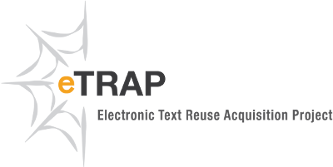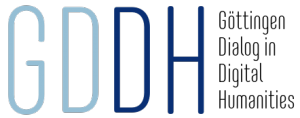The Göttingen Dialog in Digital Humanities has established a forum for the discussion of digital methods applied to all areas of the Humanities and Social Sciences, including Classics, Philosophy, History, Literature, Law, Languages, Archaeology and more. The initiative is organized by the Göttingen Centre for Digital Humanities (GCDH) with the involvement of DARIAH.EU.
The dialogs will take place every Monday from April 11th until early July 2016 in the form of 90-minute seminars. Presentations will be 45 minutes long and delivered in English, followed by 45 minutes of discussion and student participation. Seminar content should be of interest to humanists, digital humanists, librarians and computer scientists. Furthermore, we proudly announce that Prof. Dr. Stefan Gradmann (KU Leuven) will be giving the opening keynote on April 11th.
We invite submissions of abstracts describing research which employs digital methods, resources or technologies in an innovative way in order to enable a better or new understanding of the humanities, both in the past and present. We also encourage contributions describing ‘work-in-progress’. Themes may include – but are not limited to – text mining, machine learning, network analysis, time series, sentiment analysis, agent-based modelling, lexical and conceptual resources for DH, or efficient visualization of big and humanities-relevant data.
Abstracts should be written in English only. The authors of the successful abstracts will be asked to contribute a paper to a Digital Humanities Quarterly (DHQ) special issue. Furthermore, the author(s) of the best paper and talk will receive a prize of €500, which will be awarded on the basis of both the quality of the paper (50% weight) and the presentation of the research (50% weight).
A small budget for travel cost reimbursements is available upon request for the speakers.
Abstracts should be sent by February 15th at midnight CET to gddh@gcdh.de in Word.docx format only and should be a maximum of 3 pages in length. The full programme, including the venue of the dialogs, will be released before March 1st. Abstracts should be structured as follows:
- Introduction
- State of the Art
- Research methodology & Data
- Results
- Lessons learnt & further achievements (if applicable)
For any questions, do not hesitate to contact gddh@gcdh.de
GDDH Board (in alphabetical order):
- Camilla Di Biase-Dyson (Georg-August-University Göttingen)
- Marco Büchler (Göttingen Centre for Digital Humanities)
- Mariona Coll Ardanuy (Göttingen Centre for Digital Humanities)
- Jens Dierkes (Göttingen eResearch Alliance)
- Emily Franzini (Göttingen Centre for Digital Humanities)
- Greta Franzini (Göttingen Centre for Digital Humanities)
- Francesca Frontini (ILC-CNR, Pisa, Italy)
- Angelo Mario Del Grosso (ILC-CNR, Pisa, Italy)
- Berenike Herrmann (Georg-August-University Göttingen)
- Martin de la Iglesia (Niedersächsische Staats- und Universitätsbibliothek Göttingen)
- Péter Király (Gesellschaft für wissenschaftliche Datenverarbeitung mbH Göttingen)
- Bärbel Kröger (Göttingen Academy of Sciences and Humanities)
- Marion Lamé (CCJ-MMSH-CNRS, France, University and CNR, Italy)
- Mike Mertens (DARIAH.EU)
- Maria Moritz (Göttingen Centre for Digital Humanities)
- Gabriela Rotari (Georg-August-University Göttingen)
- Sarah Bowen Savant (Aga Khan University, London, UK)
- Daniel Schüller (RWTH Aachen University)
- Sree Ganesh Thotempudi (DAASI International GmbH)
- Nina Wagenknecht (Georg-August-University Göttingen)
- Jörg Wettlaufer (Göttingen Centre for Digital Humanities & Göttingen Academy of Sciences and Humanities)
- Ulrike Wuttke (Union of the German Academies of Sciences and Humanities)
This event is financially supported by the German Federal Ministry of Education and Research (No. 01UG1509).
(Microphone image: created by Alex Auda Samora from Noun Project)


Pingback: Call for Papers: 2016 Göttingen Dialog in Digital Humanities | DHd-Blog
Pingback: CfP: 2016 Göttingen Dialog in Digital Humanities |
Can you tell me if these seminars are going to be broadcast via the internet? Thank you!
Best, Amanda
Hi Amanda! This year the seminars will be recorded, yes, but I can’t tell you whether that will also include live-streaming yet. Regardless, we’ll make the recordings available via YouTube.
Ciao,
no live stream. The point is that students will be in the seminar, too, as part of a course. As for every teaching environment you can’t blame (even publically) students when saying maybe wrong things. BUT yes, a time-delayed, and if necessary processed, video will be provided.
Best,
Marco
Stefan Gradmann 🙂